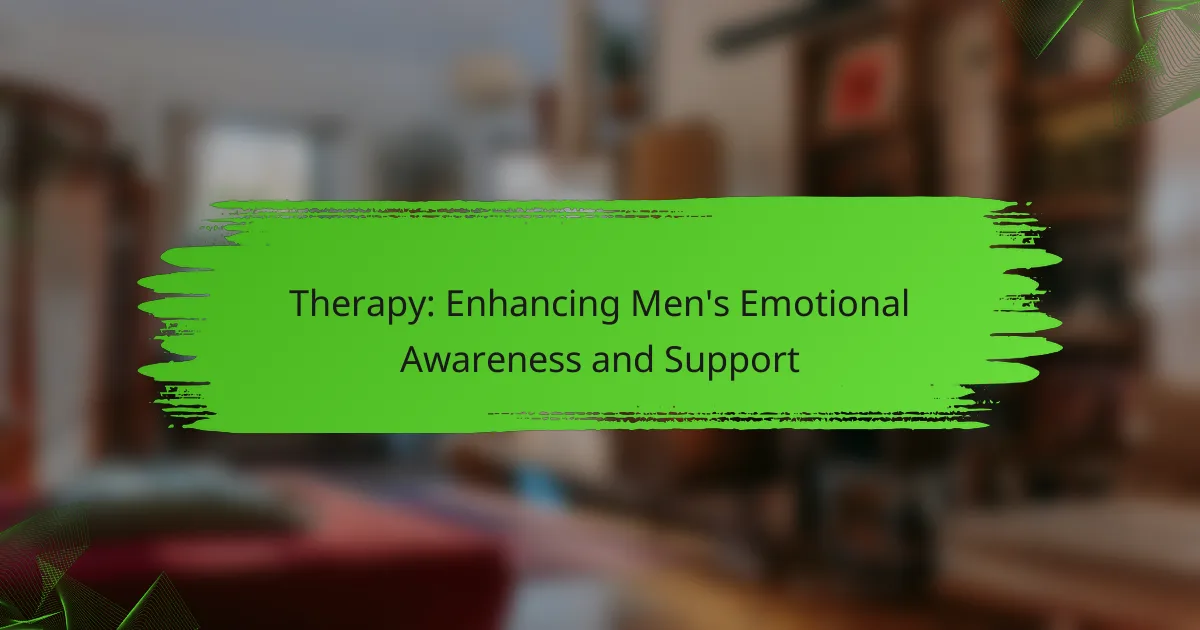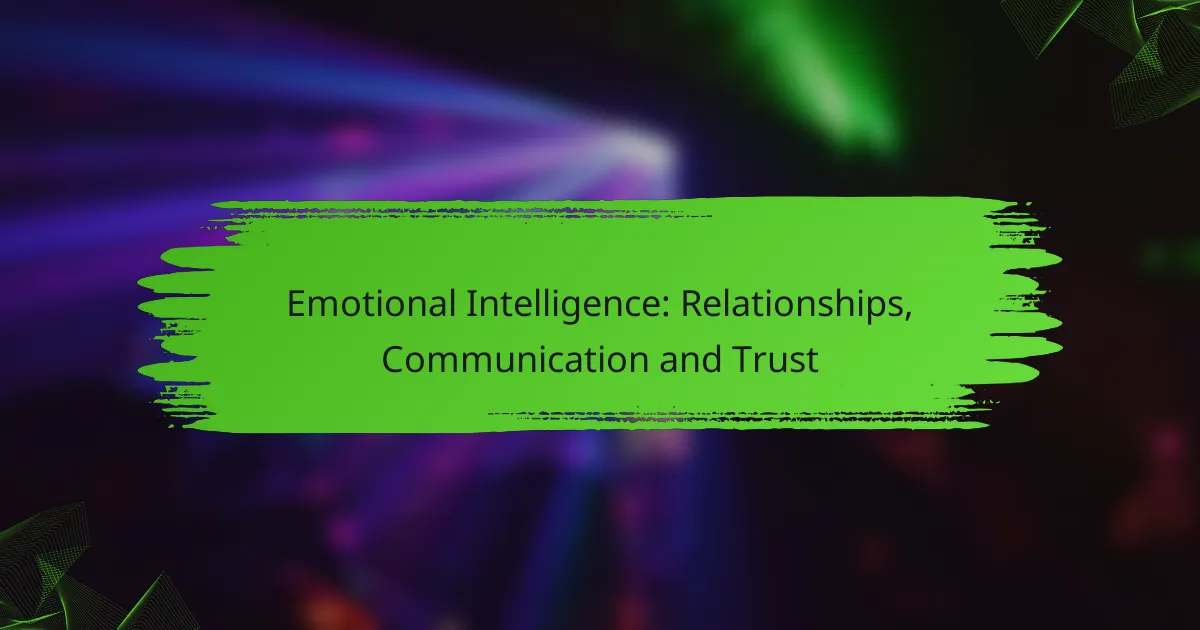Emotional intelligence (EI) plays a crucial role in achieving career success and fostering professional growth. By enhancing interpersonal skills, decision-making, and leadership abilities, individuals with high EI can effectively navigate workplace dynamics, leading to improved outcomes. Developing key components such as self-awareness, empathy, and social skills can significantly impact one’s career trajectory.

How does emotional intelligence impact career success?
Emotional intelligence (EI) significantly influences career success by enhancing interpersonal skills, decision-making, and leadership abilities. Professionals with high EI can navigate workplace dynamics more effectively, leading to better outcomes in their careers.
Improved leadership skills
Leaders with strong emotional intelligence can inspire and motivate their teams more effectively. They are adept at recognizing their own emotions and those of others, which allows them to respond appropriately in various situations. This ability fosters trust and respect, essential components of effective leadership.
For example, a leader who can empathize with their team’s challenges is more likely to provide the necessary support, leading to improved performance and morale. Developing EI can involve seeking feedback and engaging in self-reflection to enhance one’s leadership style.
Enhanced teamwork and collaboration
Emotional intelligence plays a crucial role in fostering teamwork and collaboration within organizations. Individuals with high EI are more aware of group dynamics and can facilitate open communication among team members. This awareness helps to create a more cohesive work environment.
To improve collaboration, team members should practice active listening and express their thoughts and feelings constructively. Regular team-building activities can also strengthen relationships and enhance emotional bonds, leading to better collaboration.
Better conflict resolution
Emotional intelligence equips individuals with the skills necessary for effective conflict resolution. Those with high EI can approach disagreements with empathy and understanding, allowing them to find common ground and negotiate solutions. This approach reduces tension and promotes a positive workplace atmosphere.
To resolve conflicts effectively, it is essential to remain calm and focus on the issue rather than personal attacks. Techniques such as active listening and reframing the conversation can help de-escalate conflicts and lead to productive outcomes.
Increased employee engagement
High emotional intelligence contributes to increased employee engagement by creating a supportive and motivating work environment. Employees who feel understood and valued are more likely to be committed to their roles and the organization. This engagement can lead to higher productivity and lower turnover rates.
Employers can foster engagement by recognizing individual contributions and encouraging open dialogue. Regular check-ins and feedback sessions can help employees feel connected and engaged in their work.
Higher job satisfaction
Emotional intelligence is linked to higher job satisfaction, as it helps individuals manage stress and navigate workplace challenges more effectively. Employees with strong EI are better equipped to handle the emotional demands of their roles, leading to a more fulfilling work experience.
To enhance job satisfaction, professionals should focus on developing their emotional skills, such as self-awareness and emotional regulation. Engaging in mindfulness practices and seeking professional development opportunities can also contribute to greater job satisfaction over time.

What are the key components of emotional intelligence?
The key components of emotional intelligence include self-awareness, self-regulation, empathy, social skills, and motivation. These elements are essential for understanding and managing your own emotions as well as recognizing and influencing the emotions of others, which can significantly impact career success and professional growth.
Self-awareness
Self-awareness involves recognizing your own emotions, strengths, weaknesses, values, and drivers. This understanding allows you to assess how your feelings affect your thoughts and behavior, which is crucial in a professional setting.
To enhance self-awareness, consider keeping a journal to reflect on your emotional responses in various situations. Regular feedback from colleagues can also provide insights into how your emotions influence your interactions.
Self-regulation
Self-regulation is the ability to manage your emotions and impulses effectively. This skill helps you remain calm under pressure and make thoughtful decisions rather than reacting impulsively.
Practicing mindfulness techniques, such as deep breathing or meditation, can improve self-regulation. Setting clear goals and establishing routines can also help you maintain control over your emotional responses in challenging situations.
Empathy
Empathy is the capacity to understand and share the feelings of others. It allows you to build strong relationships and respond appropriately to the emotional needs of your colleagues.
To develop empathy, actively listen to others and try to see situations from their perspectives. Engaging in conversations about feelings and experiences can enhance your ability to connect with others on an emotional level.
Social skills
Social skills encompass the ability to communicate effectively, build rapport, and manage conflicts. Strong social skills are vital for teamwork and collaboration in any workplace.
To improve your social skills, practice active listening, maintain eye contact, and engage in small talk to build connections. Participating in team activities can also provide opportunities to enhance your interpersonal skills.
Motivation
Motivation refers to the inner drive to pursue goals with energy and persistence. High emotional intelligence often correlates with intrinsic motivation, which can lead to greater job satisfaction and performance.
To foster motivation, set personal and professional goals that align with your values. Celebrating small achievements along the way can help maintain your enthusiasm and commitment to your objectives.

How can emotional intelligence be developed in professionals?
Emotional intelligence can be developed through various methods that enhance self-awareness, empathy, and interpersonal skills. Professionals can engage in structured programs, seek mentorship, and practice self-reflection to improve their emotional competencies.
Training programs
Training programs focused on emotional intelligence often include workshops that cover key concepts such as emotional awareness, regulation, and social skills. These programs typically last from a few days to several weeks and may involve role-playing and group discussions to reinforce learning.
Consider enrolling in programs that are accredited or recognized by professional organizations, as these often provide a more comprehensive curriculum. Look for options that offer practical exercises to apply emotional intelligence in real-life scenarios.
Coaching and mentorship
Coaching and mentorship can significantly enhance emotional intelligence by providing personalized guidance and feedback. A mentor can help identify emotional triggers and suggest strategies for managing them effectively.
Choose a mentor who excels in emotional intelligence and can model these skills. Regular check-ins and open conversations about emotional challenges can foster growth and accountability.
Self-reflection practices
Self-reflection practices, such as journaling or mindfulness meditation, allow professionals to assess their emotional responses and behaviors. Setting aside time each day to reflect on interactions can reveal patterns and areas for improvement.
Incorporate specific questions into your reflection, such as “How did I respond to stress today?” or “What emotions did I observe in others?” This can deepen your understanding of emotional dynamics in the workplace.
Workshops and seminars
Workshops and seminars provide opportunities to learn about emotional intelligence in a collaborative environment. These sessions often include interactive activities that encourage participants to practice their skills in real-time.
Look for workshops that offer a mix of theory and practice, as this balance can enhance retention and application of emotional intelligence concepts. Networking with other attendees can also provide valuable insights and support.
Online courses
Online courses offer flexibility and accessibility for professionals looking to develop emotional intelligence at their own pace. Many platforms provide courses that cover various aspects of emotional intelligence, from foundational concepts to advanced applications.
When selecting an online course, check for reviews and the qualifications of the instructors. Courses that include assessments or practical assignments can help reinforce learning and ensure that you apply the concepts effectively.

What role does emotional intelligence play in leadership?
Emotional intelligence (EI) is crucial for effective leadership as it enhances communication, decision-making, and team dynamics. Leaders with high EI can recognize their own emotions and those of others, fostering a positive work environment and driving team performance.
Understanding emotional intelligence in leadership
Emotional intelligence in leadership involves the ability to perceive, control, and evaluate emotions. This skill set enables leaders to connect with their team members on a deeper level, which can lead to increased trust and collaboration. Leaders who demonstrate EI are often more adept at navigating conflicts and motivating their teams.
The impact of emotional intelligence on team dynamics
Leaders with strong emotional intelligence can significantly influence team dynamics by promoting open communication and empathy. This creates a culture where team members feel valued and understood, leading to higher morale and productivity. For instance, a leader who actively listens to feedback can address concerns promptly, reducing tension and fostering a supportive atmosphere.
Developing emotional intelligence as a leader
To develop emotional intelligence, leaders should focus on self-awareness, self-regulation, social awareness, and relationship management. Practicing mindfulness can enhance self-awareness, while seeking feedback can improve self-regulation. Engaging in active listening and empathy exercises can strengthen social awareness and relationship management skills.
Common pitfalls in emotional intelligence
One common pitfall in emotional intelligence is the tendency to overlook the importance of emotional cues in communication. Leaders may become too focused on tasks and miss subtle signals from their team. Additionally, failing to manage one’s own emotions can lead to reactive behaviors that undermine authority and trust. Regular self-reflection and feedback can help mitigate these issues.



